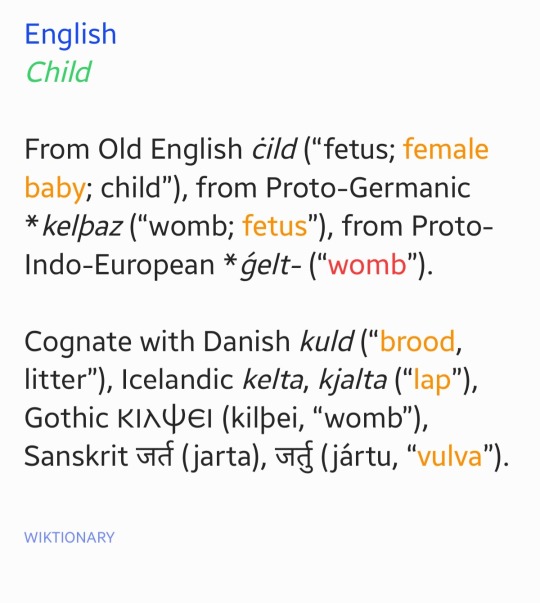Text
Blood in Proto-Indo-European
PIE distinguished two roots for "blood", depending on whether it was found inside the body or outside. The former was *h₁ésh₂r̥, the latter *krewh₂-. The lexical distinction between the two is argued to indicate two distinct metaphorical sets, which have been preserved in various derivatives and extensions in the daughters.
The root *krewh₂- yielded words signifying aggression (e.g. in derivatives such as Latin crūdēlis (“cruel”), Sanskrit क्रूर (krūra, “cruel”) and Ancient Greek κρούω (kroúō, “to beat, whip, crush”)) and dying, seen metaphorically in terms for the hardening (or freezing) of "outside blood" (e.g. in derivatives such as Latin crusta (“crust”), Old Irish crúaid (“hard”), Latvian kreve (“coagulated blood”) and Ancient Greek κρύος (krúos, “cold”)). The semantic field was thus associated with wounding, death, and drying out/hardening of the body.
On the other hand, the root *h₁ésh₂r̥ has been associated with the notion of life-giving bodily fluid, and also with the patrilineal line in kinship terminology.
WIKTIONARY
11 notes
·
View notes
Text
English
creed
From Latin crēdō (“I believe”), from Proto-Italic *krezdō, from Proto-Indo-European *ḱred dʰeh₁- (“to place one's heart, i.e., to trust, believe”), compound phrase of oblique case form of *ḱḗr (“heart”) and *dʰeh₁- (“to put, place, set”).
Creed is cognate with Old Irish cretim (“to believe”), Sanskrit श्रद्दधाति (śráddadhāti, “to have faith or faithfulness, to have belief or confidence, believe”), Avestan 𐬰𐬭𐬀𐬰𐬛𐬁 (zrazdā)
WIKTIONARY
1 note
·
View note
Text
Ancient Greek
ᾰ̓ληθής • (alēthḗs)
(of things) true, real, genuine
(of people) truthful, honest
In form it would be from ἀ- (a-, “un-”) + *ληθής, from λῆθος (lêthos, “*concealment, forgetfulness”) + -ής (-ḗs), thus "unconcealed", "unforgotten".
Ultimately from Proto-Indo-European *leh₂- (“to be concealed”) (whence λήθω (lḗthō), λανθάνω (lanthánō).
WIKTIONARY
1 note
·
View note
Text
Latin
testis
witness; one who testifies or attests
For *terstis, from Proto-Italic *tristis, from Proto-Indo-European *tristh₂s ("a third party standing", after the two parties to a contract or dispute), from *tréyes (“three”) and *steh₂- (“to stand”).
WIKTIONARY
3 notes
·
View notes
Text
English
God
From Proto-Germanic *gudą, from Proto-Indo-European *ǵʰutós (“invoked, libated, poured as part of a liquid offering”), from *ǵʰew- (“pour, libate”) + *-tós.
Cognate with Sanskrit: हुत (hutá, “offered in fire”)
WIKTIONARY
0 notes
Text
Chinese
Beware that 要飯/要饭 (yàofàn, literally “to want rice”) is a phrase with the meaning "to be a beggar/loafer" which is insulting to others and should be avoided when asking a person whether they want rice.
WIKTIONARY
0 notes
Text
Hebrew
בַּעַל זְבוּב
Ba'al Zvuv
Beelzebub, the lord of the flies, a Philistine god sometimes identified by Jews and Christians with Satan
From בַּעַל (baʿal, “lord, master; Baal”) + זְבוּב (zvuv, “fly”, the insect), appearing in the Hebrew Scriptures as the purported name of a deity worshipped by the Philistines in Ekron. It's likely this was not the god's actual name and instead was a polemic against the deity, possibly by associating the figure with defecation (hence flies).
WIKTIONARY
1 note
·
View note
Text
English
hear
From Old English hīeran, from Proto-West Germanic *hauʀijan, from Proto-Germanic *hauzijaną, from Proto-Indo-European *h₂ḱh₂owsyéti (“to be sharp-eared”), from *h₂eḱ- (“sharp”) + *h₂ows- (“ear”) + *-yéti (denominative suffix).
Cognate with Ancient Greek ᾰ̓κούω (akoúō).
WIKTIONARY
2 notes
·
View notes
Text
Romanian
dușman
enemy
Borrowed from Ottoman Turkish دشمن (düşmen), from Persian دشمن (došman), from Proto-Indo-Iranian *dušmánas (“ill-dispositioned, perverse-minded”; equivalent to *duš- (“bad”) + *mánah (“mind, thought”)), from Proto-Indo-European *dusménes.
Cognate with Ancient Greek δυσμενής (dusmenḗs, “hostile, enemy”), Sanskrit: दुर्मनास् (durmanā́s, “ill-dispositioned”), दुर्मनस् (durmanas, “sad, melancholy”).
WIKTIONARY
4 notes
·
View notes
Text
Finnish
orja /ˈorjɑ/
slave
From Proto-Finnic *orja (“slave, servant”), from Proto-Finno-Permic *orja, from Proto-Indo-Iranian *áryas ("Aryan": autonymic (self-identifying) ethnonym of the respective Indo-Iranian peoples, i.e. the Indo-Aryans and the Iranians).
Cognates include Estonian ori, Erzya уре (ure) and Udmurt вар (var).
WIKTIONARY
5 notes
·
View notes
Text
Hungarian
asszony [ˈɒsːoɲ]
woman; wife; lady
From Old Hungarian achscin, axsin, from Alanic [a Scythian language] *aχsina (mistress, lady); from Iranian *xšaiθnī-, a feminine formation from *xšāy- ("to rule").
Compare Ossetian ӕхсин (æxsin, “mistress, princess”).
WIKTIONARY
14 notes
·
View notes
Text
English
life
From Proto-Germanic *lībą (“life, body”), from *lībaną (“to remain, stay, be left”), from Proto-Indo-European *leyp-, *lip- (“to stick, glue”).
Cognate with North Frisian liff (“life, limb, person, livelihood”), West Frisian liif (“belly, abdomen”), German Leib (“body; womb”) and Leben (“life”)...
Related to belive.
WIKTIONARY
1 note
·
View note
Text
Modeh Ani (Hebrew: מודה אני; "I give thanks") is a Jewish prayer that observant Jews recite daily upon waking, while still in bed.
מוֹדֶה אֲנִי לְפָנֶיךָ מֶלֶךְ חַי וְקַיָּם. שֶׁהֶחֱזַרְתָּ בִּי נִשְׁמָתִי בְּחֶמְלָה. רַבָּה אֱמוּנָתֶךָ׃
modé 'aní l'fanékha mélekh kháy v'kayám; shehekhezárta bí nish'matí b'khemlá; rabá 'emunatékha.
I offer thanks to You, living and eternal King, for You have mercifully restored my soul within me; Your faithfulness is great.
WIKTIONARY
12 notes
·
View notes
Text
Hungarian
feleség • [ˈfɛlɛʃeːɡ]
wife
From fél (“half”) + -ség (noun-forming suffix), from Proto-Uralic *pälä (“half; side”).
Cognates include Mansi па̄л (pāl, “half, side”), Udmurt пал (pal, “half, side”).
WIKTIONARY
1 note
·
View note
Text
Finnish
vaimo
wife; (archaic) woman, especially an elderly one
From Proto-Finnic *vaimo (“spirit, soul”), from Proto-Uralic *wajŋe.
Cognates include Estonian vaim (“spirit”), Moksha вайме (vajme) and Erzya ойме (ojme, “spirit, soul”).
The semantic development to 'wife' is also shared by Karelian vaimo.
WIKTIONARY
49 notes
·
View notes
Text
Sanskrit
स्वर्ग • svargá
heaven, paradise
From Proto-Indo-Iranian *suHargás, from Proto-Indo-European *sh₂ul̥-gʷḿ̥-s, (“going to the sun”): *sóh₂wl̥ (“sun”) + *gʷem- (“to step, arrive”) + *-s.
WIKTIONARY
3 notes
·
View notes
